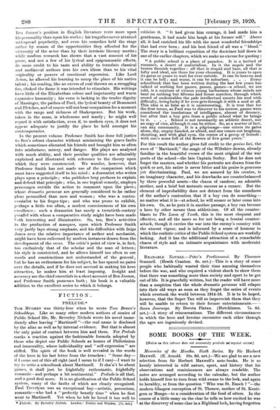FICTION.
PRELUDE.*
Tom Humus was thirty-four when he wrote Tom Brown's Schooldays. Like so many other modern authors of stories of Public School life, Mr. Beverley Nichols wrote his novel imme- diately after leaving " Martinsell "—the real name is disclosed by the alias as well as by internal evidence. But that is almost the only point of contact between him and them. For Prelude marks a reaction against the fashionable formula adopted by those who depict our Public Schools as homes of Philistinism and immorality, where individuality and " self-expression " are stifled. The spirit of the book is well revealed in the words of the hero in his last letter from the trenches : " Some day— if I come out of this all right (and I mean to if I can)—I want to try to write a schoolbook about Martinsell. It sha'n't be about games, it shall just be frightfully enthusiastic, frightfully romantic—and perhaps a bit sentimentaL" Prelude is all that, and a good deal more. It is no glorification of the Public School system, many of the faults of which are clearly recognized. Paul Trevelyan was an exceptional boy—artistic, precocious, romantic—who had a " perfectly beastly time " when he first went to Martinsell. Yet when he left he loved it too well to
• Prelude. By Beverley Nichols. London: Chatto and Whales. 17e. iota criticize it. It had given him courage, it had made him a
gentleman, it had made him laugh at his former self." Above all, it had enriched his life with the most wonderful friendships that had ever been ; and his best friend of all was a " blood." The story is a brilliant exposition of the doctrines laid down in one of the earlier chapters, which we make no excuse for quoting :
" A public school is a place of paradox. It is a hotbed of romance, a desert of materialism. In it the angels and the brutes flourish together: all that is stupid and base, all that is lofty and ideal, are there for your choosing. It is yours to open its gates or yours to wait for ever outside. It can be heaven and it can be hell ; and worse, it can be suburban. . . . Every schoolbook that has been written during the last few years has talked of nothing but games, games, games—a school, we are told, is a mixture of vicious young barbarians whose minds are bent on nothing but fifteens and house matches, through which crowd of undesirables the pale intellectual escorts his soul with difficulty, being lucky if he ever gets through it with a soul at all. This idea is as false as it is uninteresting. It is true that for the first terms, as Paul was to discover to his sorrow, games were considered the touchstone of intelligence, almost of decency, but after that a boy gets from a public school what he brings to it. . . . School is not necessarily an athletic desert, nor an orgy of vice, although it can be either. So, as a matter of fact, can any community. It is a pilgrimage—one enters its gates alone, shy, empty.handed, or afraid, and one comes out laughing, shouting, and with glad eyes, the centre of a group of friends : with one's arms full of the flowers of five great years."
For this result the author gives full credit to the genius loci, the aura of " Martinsell," the magic of the Wiltshire downs, already familiar in the beautiful verses of the most original of the war poets of the school—the late Captain Sorley. But he does not forget the masters, and whether his portraits are drawn from the quick or not, his satire is never bitter and his praise is generous yet discriminating. Paul, we are assured 1?y his creator, is an imaginary character, and his drawbacks are counterbalanced by three powerful assets—the charm of candour, an adorable mother, and a brief but meteoric success as a runner. But the element of improbability does not detract from the soundness of the author's contention that if a boy can do something— no matter what it is—at school, he will sooner or later come into his own. Or, as he puts it in another passage, a boy can become a hero by other means than athleticism. Of all the counter- blasts to The Loom of Youth, this is the most eloquent and effective, and all the more so for not being a frontal counter- attack, though it carries the war into the enemy's country with the utmost vigour, and is informed by a sense of humour in which the realistic critics of the Public School system are woefully lacking. And it has the additional attraction of a remarkable charm of style and an intimate acquaintance with modernist literature.


































 Previous page
Previous page